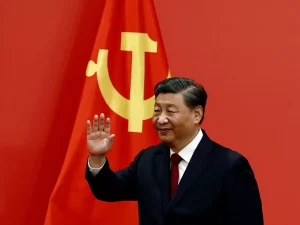In a significant development in international trade relations, China has agreed to engage in discussions with the European Union (EU) over tariffs on electric vehicles (EVs). This decision comes amidst increasing tensions between China and the EU regarding trade imbalances and the burgeoning EV market. The talks aim to address the EU’s concerns over what
In a significant development in international trade relations, China has agreed to engage in discussions with the European Union (EU) over tariffs on electric vehicles (EVs). This decision comes amidst increasing tensions between China and the EU regarding trade imbalances and the burgeoning EV market. The talks aim to address the EU’s concerns over what it perceives as unfair trade practices and to find a mutually beneficial path forward. This article delves into the background of these tensions, the potential impact on the global EV market, and the broader implications for international trade.
Background of the Tensions

This image is taken from google.com
The EU has long been a proponent of free trade, yet it has grown increasingly wary of China’s rapid industrial expansion and its implications for European industries. The EV sector is a particularly contentious area. European manufacturers argue that Chinese companies benefit from substantial state subsidies, allowing them to produce and export EVs at lower prices. This, they claim, creates an uneven playing field and threatens the competitiveness of European EV manufacturers.
In response, the EU has considered implementing tariffs on Chinese EVs to protect its domestic market. This move, however, risks escalating into a broader trade conflict, which both sides seem keen to avoid. The decision by China to enter into talks represents a significant step towards resolving these issues through diplomacy rather than through a trade war.
The EV Market Dynamics
Global Growth of the EV Market
The global EV market has experienced exponential growth over the past decade, driven by technological advancements, environmental concerns, and supportive government policies. China and the EU are two of the largest players in this market, with both regions heavily investing in EV infrastructure and production capabilities.
China is currently the largest EV market in the world, with millions of electric cars sold annually. The country’s success in this sector is partly due to substantial government subsidies and incentives designed to promote the adoption of clean energy vehicles. Meanwhile, the EU has also seen rapid growth in EV adoption, spurred by stringent environmental regulations and ambitious targets for reducing carbon emissions.
Comparative Analysis of China and EU EV Markets
| Aspect | China | European Union |
|---|---|---|
| Market Size | Largest globally | Second largest globally |
| Government Support | Extensive subsidies and incentives | Incentives, subsidies, and regulations |
| Major Players | BYD, NIO, Xpeng | Volkswagen, BMW, Renault |
| Infrastructure | Rapid expansion of charging stations | Expanding network, but varied by country |
| Environmental Impact Goals | Aggressive targets | Green Deal and carbon neutrality by 2050 |
Potential Outcomes of the Talks
Tariff Adjustments
One of the primary outcomes of the talks could be a compromise on tariffs. The EU might agree to lower or eliminate proposed tariffs in exchange for China reducing subsidies for its EV manufacturers. Such a deal could help level the playing field and foster fairer competition in the global market.
Strengthened Trade Relations
Engaging in constructive dialogue could also strengthen overall trade relations between China and the EU. By addressing one of the most contentious issues head-on, both sides can build trust and potentially collaborate on other areas of mutual interest, such as technology sharing, research, and development in the EV sector.
Market Impact
Any agreement reached could significantly impact the global EV market. A reduction in trade tensions might encourage more cross-border investment and partnerships, accelerating innovation and the adoption of EVs worldwide. Conversely, if talks fail and tariffs are imposed, it could lead to increased costs for consumers and slow down the growth of the EV market.
Broader Implications for International Trade
Impact on Multilateral Trade Agreements
The outcome of these talks could set a precedent for how trade disputes in emerging industries are handled. Successful negotiations might encourage other countries to resolve their trade issues through dialogue rather than through protectionist measures. This could be particularly important as the global economy becomes increasingly interconnected and reliant on technology-driven sectors.
Implications for Trade Policies
The EU and China are major players in global trade, and their actions often influence policies in other regions. A successful resolution could lead to a shift in trade policies, emphasizing cooperation over conflict. It could also spur reforms in international trade rules, particularly those related to subsidies and state support for industries.
Environmental and Economic Considerations
Resolving the EV tariff dispute amicably could also have significant environmental and economic benefits. By promoting fair competition and innovation, both regions can accelerate their progress towards environmental goals. This is crucial in the fight against climate change, as the transportation sector is a major contributor to global carbon emissions.
Comparative Analysis of Potential Outcomes
| Outcome | Positive Impacts | Negative Impacts |
|---|---|---|
| Tariff Adjustments | Fairer competition, reduced trade tensions | Potential short-term disruption to markets |
| Strengthened Trade Relations | Enhanced cooperation, trust-building | Possible concessions that may not please all stakeholders |
| Market Impact | Accelerated innovation, increased investment | Potential initial cost increases for consumers |
| Impact on Multilateral Trade | Encourages dialogue over conflict | May set high expectations for other trade disputes |
| Environmental Benefits | Faster progress towards emission reduction goals | Possible slow initial adjustment phase |
Conclusion
The agreement by China to enter talks with the EU over EV tariffs is a pivotal moment in international trade relations. It highlights the importance of diplomacy in resolving complex trade disputes and the need for cooperation in emerging industries like electric vehicles. The outcome of these discussions will not only impact the EV market but could also influence broader trade policies and environmental strategies globally. As both regions strive to balance economic growth with environmental sustainability, their ability to find common ground will be crucial in shaping the future of the global economy.
















